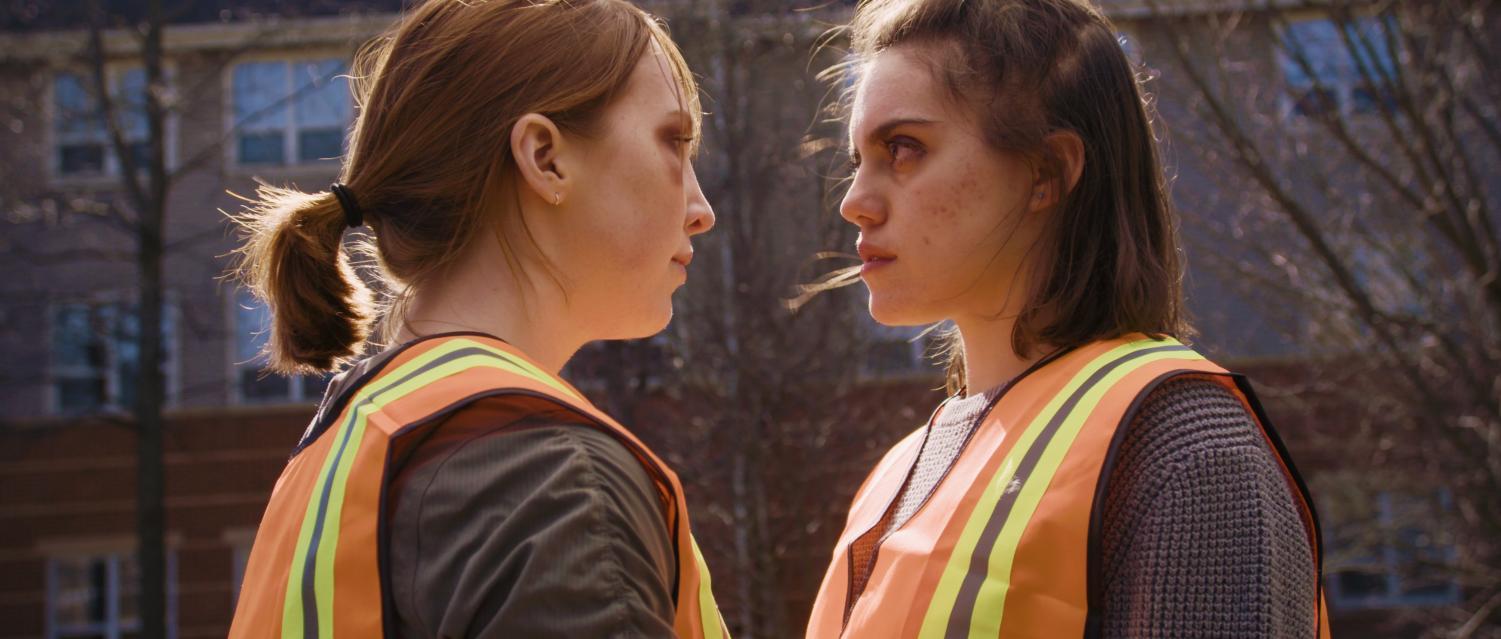‘I want to see that representation’: Pitt grads develop LGBTQ+ coming-of-age film


In the short film “Thanks to Her,” Millie and Andy are two teens forced to spend time together after being sent to the principal’s office for getting into a fight after Millie’s friend insults Andy for being a lesbian. The film was written and co-directed by Pitt alum Sam Orlowski.
The award-winning short film “Thanks to Her” builds up to the emotional resolution of the story with the line, “You think it’s easy for me to be gay?” It’s the start of a monologue that explores the speaker’s personal exploration of her sexuality, and highlights the core themes the Pitt graduates who made the film wanted to present.
“Thanks To Her” is a recently released short film written and co-directed by Sam Orlowski, a film studies major who graduated from Pitt in 2019. Filmed in Pittsburgh, the rough cut of “Thanks To Her” premiered in 2019, and the short was released in full on YouTube in 2020. While the film is only about 20 minutes long, the crew is currently holding a Kickstarter campaign to fund a feature-length version.
The short film is an LGBTQ+ coming-of-age story about two students, Millie and Andy, who are forced to spend time together after being sent to the principal’s office for getting into a fight when Millie’s friend insults Andy for being a lesbian.
The film recently won an award at the Voices Rising Film Festival. The Jewish Association on Aging, a senior living facility where part of the film was shot, will host a screening followed by a Q&A with the cast and crew on Thursday.
Orlowski originally wrote the script as a senior at Pitt in 2018 and said she wanted to create something based on personal experience.
“Being a member of the LGBT community myself, I was like, ‘OK, I want to see good Sapphic representation,’” Orlowski said. “Movies and TV either bait Sapphic relationships, or kill off one of them, or just sexualize them entirely, and it’s rarely wholesome, good Sapphic content. And I was like, ‘That’s what I want to write. That’s what I want to give to this community.’”
The character of Andy is specifically an asexual lesbian — a sexual orientation not often seen in film and television. Orlowski wanted to include it to create better representation for asexual people.
“I myself am ace, and I obviously noticed that that’s never, ever brought up. And I was just like, you know what? I want her to be ace, because I want to see that representation myself,” Orlowski said. “I just want to put some light to who asexual people are.”
Orlowski co-directed the film with Sam McCoy — a 2019 Pitt alum who majored in film production and communication.
“Sam [Orlowski] and I were both film majors at the same time, and we ended up being in the same capstone course,” McCoy said, “and we were connected through our professor, Carl Kurlander. She had heard that I directed a few things and asked if I was interested [in helping with the film].”
Since the film was originally a feature-length script, Orlowski shortened it so that it would be easier to produce. McCoy said the section Orlowski chose worked very well on its own.
“It’s beautiful and it’s succinct and it doesn’t tell the full story, but it tells a good one and an important one. And it feels like the first chapter in their story,” McCoy said.
The production received the Personalized Education Grant from the University in February 2019, and began production that spring. Hayley Ulmer graduated from Pitt in 2018 and worked on the short as the associate director, so that the project could have collaboration between students and people working in the industry.
“They wanted to kind of collaborate between professionals and students for this short film project, so they hired me to be the assistant director on that project. And now, moving forward, I’m producing this project, the feature,” Ulmer said.
Ulmer was a theater major at Pitt, and currently works on filming commercials locally.
After assembling a crew, the team filmed the short in various locations on and off campus, according to McCoy.
“We used a combination of our own personal homes and Pitt’s campus as well. The principal scene is actually our professor’s office in the Cathedral of Learning. And then the JAA, the Jewish community center — it was a nursing home and it recently closed, but that was where the nursing home scenes took place,” McCoy said.
According to Orlowski, the film has been very well received on YouTube, especially among LGBTQ+ viewers, to the delight of the crew.
“We got a lot of heartwarming comments on the short film,” Orlowski said. “A lot of people really appreciated seeing the representation on screen. I’m just like, well, I just want to keep doing that. I just want to keep giving people a chance to see their identity on screen.”
McCoy said she was excited reading the comments and seeing the reactions to the story.
“The most exciting part — and I think everybody on the team will agree with this — was reading the comments,” McCoy said. “It’s so amazing to read that people not only resonated with the story, but appreciated the story.”
Ulmer said she was happy the film resonated with first-time viewers.
“I think you kind of forget that other people are seeing it for the first time, and it might be something that they need to hear or need to see,” Ulmer said. “I guess knowing that you can touch people like that is — I mean, I guess it’s like why you do it.”
Orlowski said she was particularly happy to read comments from people who felt seen by her film.
“There’s people out there that have no outlet for who they are or they can’t show who they are, and that’s why I really want the film to be out there. So then people can at least watch themselves on the screen, even if they can’t be who they are with their friends with their family,” Orlowski said.
The Kickstarter to fund the feature-length version of the film — based on a revised version of Orlowski’s original script — is currently 40% funded, though Orlowski said even if it doesn’t reach its goal, they still want to go forward with the project.
“We’ve come to the agreement that like no matter what amount of money we’re gonna get, we’re going to make a feature,” Orlowski said. “It’s just good for all of our careers to have a feature under our belt … [and] all of us really want to tell the expanded version of the short film.”
Ulmer said the extended version of the film will go into more depth on certain parts of the story and characters.
“It’s going to expand on like the two main characters, it’s going to kind of go into some of their relationship a little bit more and their backgrounds, as well as it’s more of an intergenerational story, so it deals with some older LGBTQ people and in a much more in-depth way than the short film does,” Ulmer said.
McCoy said anyone can enjoy this film, regardless of age or sexuality.
“It’s not just a film for the LGBT community, but also it’s for allies as well. It’s also intergenerational,” McCoy said. “It’s for everybody. I think anybody can learn something from it and see themselves in it, and I think that’s what makes the writing and then the final product of it so special.”
Recent Posts
SGB introduces new governing code bill and addresses rumors of ICE on campus
At its weekly meeting at Nordy’s Place on Tuesday, Student Government Board introduced an omnibus…
Opinion | School should be in the summer
Although this may be controversial, I believe that from this data, it is evident that…
Weathering the storm: Pittsburgh teams have tackled some of the toughest environments
The end of the year in western Pennsylvania is always marked by two things —…
Notes From an Average Girl // Notes on Book Banning
In this edition of Notes From an Average Girl, senior staff writer Madeline Milchman writes…
To Be Honest // Yup, it is that damn phone
In this edition of To Be Honest, staff writer Evin Verbrugge writes about her phone…
Meaning at the Movies | Portraying Toxic ‘Adolescence’
In this edition of Meaning at the Movies, staff writer Lauren Deaton explores the mini-series…


